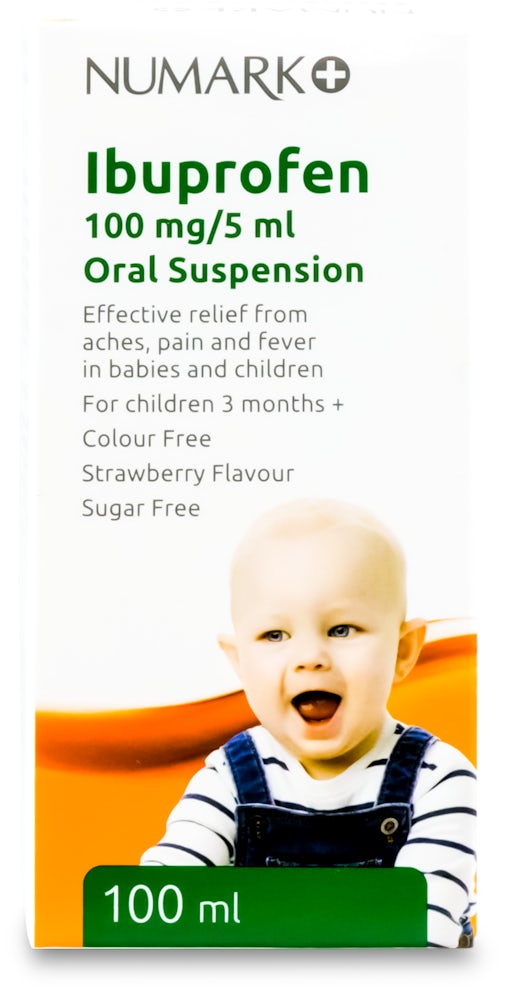Numark Ibuprofen 100mg/5ml Oral Suspension 100ml
Numark Ibuprofen 100mg/5ml Oral Suspension 100ml
What 500,000+ customers say about medino:
Get notified when back in stock
Description
Ibuprofen Oral Suspension contains ibuprofen as the active ingredient. Ibuprofen Suspension is given to children as a painkiller for relief of mild to moderate muscular pain, headaches, sore throats, teething pain and toothache. This can also be used in minor injuries such as sprains and strains.
Ingredients
The active ingredient is ibuprofen 100mg per 5ml.
The other ingredients are: Glycerol (E422), Xanthan Gum, Maltitol (E965), Polysorbate 80, Saccharin Sodium (E954), Citric Acid Monohydrate, Sodium Methyl Hydroxybenzoate (E219), Sodium Propyl Hydroxybenzoate (E217), Purified Water and Strawberry Flavour.
Usage and Instructions
Shake the bottle well before measuring the dose. A measuring spoon is provided to ensure accuracy. The small spoon measures a 2.5ml dose and the larger spoon measures 5ml.
This medicine should NOT be given if your child weighs less than 5kg. The usual daily dose in children is 20mg per kg of bodyweight in divided doses, every 6 to 8 hours if required. Leave at least 4 hours between doses. For short term use only. Consult a doctor promptly if symptoms persist or worsen.
DOSAGE:
Children (A spoon is provided to measure doses of 2.5ml or 5ml)
Babies under 3 months: Do not give
From 3 up to 6 months (weighing over 5kg): 2.5ml 3 times a day. Do not give for more than 24 hours.
From 6 months up to 1 year: 2.5ml 3 to 4 times a day.
From 1 year up to 4 years: 5ml 3 times a day.
From 4 years up to 7 years: 7.5ml 3 times a day 3 days.
From 7 years up to 12 years: 10ml 3 times a day.
Do not give to children aged from 6 months and older for more than three days.
Warnings
DO NOT EXCEED THE STATED DOSE
Do NOT give this medicine if your child:
• has an allergy or hypersensitivity to ibuprofen or any of the other ingredients in this medicine.
• has had an allergic reaction or wheezing after taking aspirin or other non-steroidal anti-inflammatory painkillers.
• has ever had a stomach ulcer or a history of bleeding into, or perforation of, the intestine especially after previous NSAID treatment (symptoms may include severe stomach pain or vomiting blood that contains dark particles)
• is taking any other non-steroidal anti-inflammatory painkillers (NSAIDs).
• has ever had severe kidney, heart or liver problems.
• has an inherited intolerance to some sugars.
• is less than 3 months old.
• is taking aspirin above 75mg daily.
There is a risk of renal (kidney) impairment in dehydrated children. You should discuss your child’s treatment with your child’s doctor or pharmacist before giving Ibuprofen Oral Suspension, if your child:
• has high blood pressure, kidney or liver problems.
• has asthma or diabetes.
• has lupus or a mixed connective tissue disease.
• has a chronic inflammatory intestinal disease such as ulcerative colitis, Crohn’s disease or gastrointestinal bleeding.
• has chicken pox.
Side Effects
The most common side-effect is irritation of the stomach which can cause problems in some patients.
If your child suffers from the following, stop giving the medicine and seek immediate medical help:
• Passing blood in their faeces (stools/motions).
• Passing black tarry stools.
• Vomiting blood or dark particles that look like ground coffee.
• Unexplained wheezing, shortness of breath, skin rash (which may be severe and include blistering or peeling of the skin), itching or bruising, lightheadedness, racing of the heart or fluid retention e.g. swollen ankles, not passing enough urine.
• stiff neck, headache, nausea, vomiting, fever and disorientation.
If your child experiences any of the following, stop giving the medicine and tell your doctor immediately:
• If your child’s skin starts to turn red or they develop a varied skin reaction or their skin starts to blister or peel, this is very rare.
• Unexplained stomach pain, indigestion, heartburn, feeling sick and/or vomiting.
• Yellowing of the eyes and/or skin.
• Severe sore throat with high fever or unexplained bleeding, bruising and tiredness.
Other unusual effects may include the following:
Uncommon:
• Headache
Rare:
• Ibuprofen may be associated with a small increased risk of heart attack ("myocardial infarction") or stroke. Any risk is more likely with high doses and prolonged treatment.
• Flatulence, diarrhoea or constipation.
Very Rare:
• Occasionally hypersensitivity reactions may occur which can cause skin rashes.
• Liver and kidney problems may occur with Ibuprofen.
• Crohn's disease or ulcerative colitis or other stomach problems may be exacerbated.
If you get any side effects, talk to your doctor or pharmacist. This includes any possible side effects not listed.







